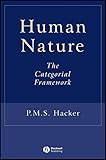Found in 2 comments on Hacker News
mabub24 · 2017-06-19
· Original
thread
I would highly recommend [P.M.S. Hacker's "Human Nature: The Categorical Framework](https://www.amazon.com/Human-Nature-Categorial-Framework-Hac...).
Hacker is an excellent philosopher and a very clear writer. He starts from broad categories to look at human nature and what it makes sense to say of the nature of sentient animals, insentient animals, and inanimate things.
The main relevant chapters are:
1. "Agents and Actors", 2. "Teleological Explanation", and 3. "Reasons and Explanation of Human Action".
His main point is that many "unanswerable" questions in neuroscience and behavioral science are simply nonsensical because they play with conceptual confusions.
I would also highly recommend his sequel book "The Intellectual Powers: A Study of Human Nature".


The article for this post discusses this. Many animals have complex behaviors. For instance, the two links you have posted are examples. But faced with new problems they buckle and cannot deal.
The ravens are interesting, I will read that study. But saying they're intelligent is not the same thing as saying they are cogitative, for they don't possess the language to express cogitative experiences in the same we, and only we, do.
This has been a discussion point in Analytical Philosophy for a number of years, particularly during the rise of Cognitive Neuroscience. PMS Hacker, in particular, has written a lot about this topic, I would recommend his two books:
(https://www.amazon.com/Human-Nature-Categorial-Framework-Hac...) "This major study examines the most fundamental categories in terms of which we conceive of ourselves, critically surveying the concepts of substance, causation, agency, teleology, rationality, mind, body and person, and elaborating the conceptual fields in which they are embedded."
And;
(https://www.amazon.com/Intellectual-Powers-Study-Human-Natur...) "The Intellectual Powers is a philosophical investigation into the cognitive and cogitative powers of mankind. It develops a connective analysis of our powers of consciousness, intentionality, mastery of language, knowledge, belief, certainty, sensation, perception, memory, thought, and imagination, by one of Britain’s leading philosophers. It is an essential guide and handbook for philosophers, psychologists, and cognitive neuroscientists."
Both of which heavily interact with relevant research and articles in cognitive neuroscience and neuroscience more broadly.